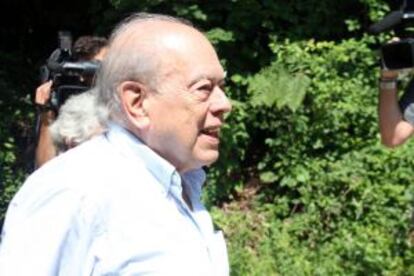Podemos courts the Catalan vote
Party chief Pablo Iglesias tells Barcelona crowd sovereignty goes beyond secession issues


The leaders of Spain’s emerging political force, Podemos, visited Catalonia on Sunday to try to convince voters that they are a credible alternative to the unionist-secessionist dilemma.
Party chief Pablo Iglesias’ strategy is based on portraying the ruling bloc Convergence and Union (CiU) as corrupt and responsible for the austerity measures that have brought cuts to public health and education.
Iglesias is also studiously avoiding any clear positions on the independence issue, saying he would like for Catalonia to remain part of Spain but that Catalans have the right to decide.
Iglesias has stated he wants Catalonia to remain part of Spain but says that Catalans have the right to decide
Speaking before a packed crowd of 3,000 inside the Vall d’Hebron sports arena in Barcelona – hundreds more were turned away due to the lack of standing room – Iglesias sought to move his audience with a message of hope and change.
“Do I want Catalonia to leave? No, I do not. But I know that the Spanish caste has insulted Catalans,” he said, using Podemos’ standard term to refer to what they see as a corrupt clique of self-serving politicians who run the country as they would a private estate.
Podemos, which burst onto the scene in May with a strong showing in the European elections and has since been growing exponentially in voter intention, is seeking to win votes in Catalonia with a view to next year’s general elections.
But the different dynamics of this northeastern region, particularly since Premier Artur Mas launched his independence drive two years ago, is forcing Podemos to adapt its rhetoric.
As such, Iglesias is seeking to extend the notion of “right to decide” beyond secession issues, to include “all issues.”
Iglesias is seeking to extend the notion of “right to decide” beyond just secession, to include “all issues”
“The right to decide means that the law should not go after people who cannot pay a mortgage, but that the law should go after tax evaders,” he said.
The rally was attended by several politicians from other parties, including former Catalan premier Pasqual Maragall, a Socialist, and Joan Tardà of the Catalan Republican Left, which strongly favors secession from Spain.
Flags, either Spanish or Catalan, were conspicuously absent from the event, coinciding with Podemos’ view that the issues that really matter go beyond nationalities.
“I don’t care about bracelets. I care about bank accounts. Whoever keeps accounts in Switzerland and Andorra has a name: traitor. A traitor to his people, whether his name is Pujol or Rodrigo Rato: their only home is their money,” he said.

Iglesias was referring to former Popular Party heavyweight Rato, now suspected of wrongdoing while he headed the savings bank Caja Madrid, and to Jordi Pujol, one of the founding fathers of modern Catalan nationalism, currently under scrutiny for an undeclared fortune he kept abroad. Several of his children are also being investigated for their business dealings.
“I have come to Catalonia to ask Catalans to be in Madrid on January 31 [at the March for Change] to tell rulers in Madrid and also in Barcelona that their time is over,” said Iglesias, seeking to bring everyone into the fold of opposition to the political system. “You will never see me embracing either [Spanish PM Mariano] or [Catalan premier Artur] Mas.”
Although a CiU official, Josep Rull, said that if Podemos wants to be consistent about renewing politics it needs to support a binding referendum in Catalonia, Iglesias took the sovereignty debate to different ground.
“Sovereignty means that the representatives of the people do not represent investment funds,” he said.
Tu suscripción se está usando en otro dispositivo
¿Quieres añadir otro usuario a tu suscripción?
Si continúas leyendo en este dispositivo, no se podrá leer en el otro.
FlechaTu suscripción se está usando en otro dispositivo y solo puedes acceder a EL PAÍS desde un dispositivo a la vez.
Si quieres compartir tu cuenta, cambia tu suscripción a la modalidad Premium, así podrás añadir otro usuario. Cada uno accederá con su propia cuenta de email, lo que os permitirá personalizar vuestra experiencia en EL PAÍS.
En el caso de no saber quién está usando tu cuenta, te recomendamos cambiar tu contraseña aquí.
Si decides continuar compartiendo tu cuenta, este mensaje se mostrará en tu dispositivo y en el de la otra persona que está usando tu cuenta de forma indefinida, afectando a tu experiencia de lectura. Puedes consultar aquí los términos y condiciones de la suscripción digital.








































